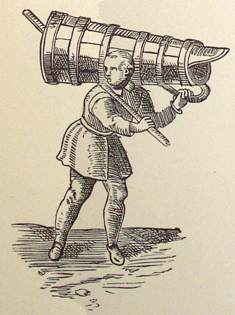A Water-carrier
Water, even in the country, and especially in the city, was likely to be a carrier of disease*. For this reason, those who could afford it drank small ale or beer, using water only for washing. Click here to learn about the sewers in London.
Conduits (one is pictured here) brought water to the centre of the city, where water-carriers took it to homes and shops.
A doctor's opinion
Water is not wholesome, sole by itself, for an Englishman. . . water is cold, slow, and slack of digestion.
The best water is rain-water, so be it that it be clean and purely taken. Next to it is running water, the which doth swiftly run from the east unto the west upon stones or pebbles. The third water to be praised is river or brook water, the which is clear, running on pebbles and gravel.
Standing waters, the which be refreshed with a fresh spring, [are] commendable; but standing waters and well-waters, to which the sun hath no reflection, although they be nigher than other running waters be, yet they be not so commendable. And let every man beware of all waters the which be standing, and be putrified with froth*. . .
The water the which every man ought to dress his meat withal, or shall use baking or brewing, let it be running; and put it in vessels that it may stand there two or three hours ere it be occupied; then strain the upper part through a thick linen cloth, and cast the inferial part away.
The doctor was Andrew Boorde; the passage is from A Dyetary of Helth [1542], pp. 252-3.
Footnotes
-
Antony's strong stomach
Caesar has words of high praise for Antony's earlier fortitude in hardship, drinking foul water when there was no other:
". . . Thou did'st drink
The stale [urine] of horses and the gilded puddle
Which beasts would cough at."
(Antony and Cleopatra 1.4.61-63)
